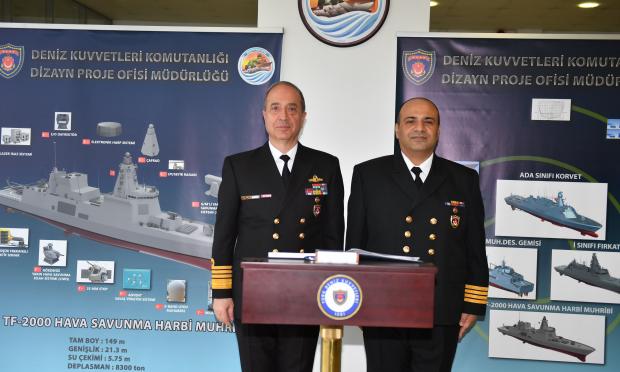Turkey continues its shipbuilding programme unabated as its clear revisionist objective is the complete domination of the whole range of the "Blue Homeland".
In this context, the foundations were laid today for the construction of heavy missile destroyers with the same capabilities as the American Arleigh Burke. As stated in a post by the Turkish Ministry of Defence: "Admiral Ercüment Tatlıoğlu, Commander of the Naval Forces, visited the Istanbul Shipyard Command and the Naval Forces Project Planning Office (DPO) located in the Istanbul area. Admiral Ercüment Tatlıoğlu,received information on the ongoing repair and rehabilitation activities at the Istanbul Savarona Shipyard and presented the design and roadmap of the destroyer TF-2000, which is the 3rd project of the local and national MİLGEM ship design family after the corvette and frigate, and the 4th project aircraft in the Project Design Office Examined the ship design concept."
"You mentioned the building of a second, more advanced, Turkish helicopter carrier. And the big question one would ask is why this ship is being built. Is it simply to parade in the Bosphorus or is Turkey claiming full supremacy and control of the eastern Mediterranean on the basis of texts that it has signed, such as the Turkish-Colombian memorandum which is non-existent but Turkey continues to invoke it and if that is the Turkish perception, as indicated by positions that Turkey has not changed." This reference by Defence Minister Nikos Dendias to Turkey's shipbuilding programme during the briefing of the relevant committee of the Parliament, demonstrates if nothing else that Athens is aware of the situation and is monitoring it with obvious concern...
In practice, at the present stage the Turkish fleet can deploy a mini aircraft carrier - helicopter carrier, even though at the moment it can only be equipped with drones, 17 frigates, 4 corvettes and 13 submarines equipped with domestic Akya heavy torpedoes. It aims to deploy around 2030 or shortly thereafter 16 modern but modernized frigates, build an even larger aircraft carrier next to Anadolu, 18 submarines and the 4 corvettes while it will be in the initial phases of building 7 heavy destroyers.
Similarly, Greece currently has 13 frigates, of which 9 need to be withdrawn and 4 need modernization, no corvettes and 10 submarines. The goal is around 2030 or shortly after to have the 3 Kimon class frigates, the 4 modernized MEKOs, up to 4 LCS frigates and to start building up to 7 Constellation frigates while hoping to keep all 10 submarines operational. On the Turkish shipbuilding program we sought the opinion of military analyst, at Turkey's largest think tank SETA and former military Dr. Murat Aslan. The Turkish analyst pointed out: "Turkey has followed a naval shipbuilding program for many years based on national capabilities. Such a program - building a navy and maintaining it - is an effort that consumes time and funding that most countries wish they had but limit their possession of. In this sense, Turkey has directed the priority of the naval program to rely on national production and sustainment, including engineering services and subsystem procurement through Turkish contractors. This path will facilitate expertise and inexpensive maintenance to replace legacy naval platforms and associated sensitive weapons and electronic systems.
The reason for the expansion of the naval program is the requirement to be a regional power. Once any situation breaks out in the near region, Turkey should be able to project forces for a political outcome. The case of Libya is a very important example of this objective. Turkey sent warships to prevent Haftar's improvised army from taking over Tripoli. A more capable fleet with air power would speed up the process. This is why Turkey has the Anadolu platform.
Turkey's naval program relies not only on building the latest generation of platforms, but also radar, intelligence, weapons and ammunition systems that stop reliance on foreign suppliers. In this context, any covert sanction will not hinder Turkey's strategic visions and tactical decisions.
Since there is concern in the Greek public opinion whether this program will negatively affect the security of Greece: No! Turkey wants to follow the demands of a positive agenda and perceives Greece as a future partner. The current threats and risks are flexible and have the potential to challenge both Turkey and Greece. The projection of expected conflicts in the region and the world requires a high level of preparedness that Greece and Turkey should be in the same club. Otherwise, the costs will be borne in the context of both hard and soft threats."
Since there is concern in the Greek public opinion whether this program will negatively affect the security of Greece: No! Turkey wants to follow the demands of a positive agenda and perceives Greece as a future partner. The current threats and risks are flexible and have the potential to challenge both Turkey and Greece. The projection of expected conflicts in the region and the world requires a high level of preparedness that Greece and Turkey should be in the same club. Otherwise, the costs will be borne in the context of both hard and soft threats."



